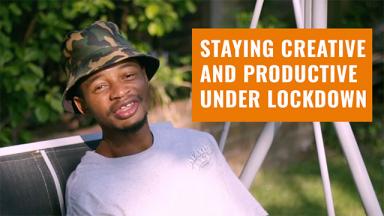
I want to be in a position where I can hand on heart say I’ve fought to give people the same opportunities as I had.
Written by Lily Fontaine as part of Youth Music Next Gen.
When the lockdown was announced, the Mercury Prize-shortlisted modern-soul collective were heading into the final stages of their third record. It was a disappointing interruption but, as Jungle’s Tom McFarland explained when we chatted over Zoom, friends with months of live shows in the calendar took the greatest hit.
“We’re very fortunate that we finished our touring… I’ve got a lot of friends who are in bands or who work with bands that had eight months of touring completely scrapped and that’s a massive tragedy because they’ve got kids and they’ve got mortgages. I trust that once it’s safe and people have confidence going back into confined spaces with lots of people, which is ultimately what live music is about, the appetite will still be there...”
The prospect of returning to a more excited and engaged audience experience is motivational.
“I heard an interesting quote the other day on Radio Four, she [a guest] said ‘I feel a little bit boring as a person now because I’m not digesting culture and art in the same ways as I was before.’...We played a gig in Ecuador [before lockdown].... because it’s not something they encounter on a day-to day basis, their engagement seems to be much higher than that of a crowd in London.”

However, the lockdown itself hasn’t inspired Jungle nearly as much as the recent Black Lives Matter protests, and the conversations around them.
“No one wants to hear songs about sitting in your room - [lockdown] was a massive social upheaval but not one with much artistic merit or poetic value…. I think the most defining recent event was the killing of George Floyd. That has given me a chance to reflect upon the opportunities I’ve been given as a white man. I want to be in a position where I can hand on heart say I’ve fought to give people the same opportunities as I had. It’s definitely in my power now. That’s what white people need to realise; no one is blaming you for what people have done in the past. What we’re asking people in privileged positions to do is understand that and use it for change.”
Reflecting on the distributions of power are familiar for Tom as a musician working within the industry. He advises emerging artists to not let the promise of a hefty advance convince them to sign away the ownership of their music.
“People won’t change their mind on a corporate level unless there is pressure from the people that make their money for them. The power of the creator needs to be the most important power. Invest in yourself by understanding that the next few years are going to be hard while you’re fighting to secure your status as an independent artist, with a team around you that you love and trust to do the work on your behalf. You’ve got to not be sucked in by that big straight-up pay check.”
Money should not be the driving factor (and isn’t always available or necessary) when it comes to making quality art; Jungle’s music video for the debut that defined their visual aesthetic - a one-shot recording of a six-year-old B-girl - was relatively DIY:
“I was pushing the grip because the budget was £200... it covered her and her dad’s train from Wolverhampton... if it requires me standing in a field at four o’clock in the morning holding an umbrella above the camera so it doesn’t get wet, I’ll do that because that’s my passion. The amount of money you have does not correlate to your success... but it’s obviously a necessity in this world… getting sync [music licensed for film, TV series, adverts, video games, etc] is good because those are instant big sums of money. Touring is where we have made 90% of our income, and that’s the way to get your music out there with the most impact. That human connection on stage is second to none - I don’t think any marketing campaign can replicate it."
Nothing represents that connection more than the video for ‘Smile’ from Jungle’s second album, For Ever. Filmed at Nile Rodgers’ Meltdown Festival in 2019, it’s a visual representation of the relatable fan desire to dance their way past the barriers and onto the stage
“Part of the joy of being on stage is feeling that energy. It’s like a cycle; the more you give to people, the more they give back. That video is the least considered video we’ve ever made. There are so many amazing accidents in that video, Jay comes offstage and completely by accident, Nile Rodgers is standing there. You can’t fake that, you can’t write that, and that’s another thing - try and be off-the-cuff with whatever you do as an artist.”
Tom explained how his introduction to music was taught by ear, however, the duo truly learned to work organically after they left their first band - which had them young and signed, but forcing music for the purpose of success.
“I thought, I'm in this ride but I'm not the driver and I believe in my own creativity...that is not the sort of art I want to watch so why would I create art like that? I was listening to a lot of 70s soul and funk, Krautrock - I love Can and Neu!, and English psychedelic music - I love my Pink Floyd. It was just effortless really. The process of the creation of those early Jungle tracks felt supernatural, and it was just me and my best mate in his bedroom making tunes.
“It is that survival of the fittest, dog eat dog, if you’re not winning you’re losing, mentality. The whole system is based around success but if you’re not making mistakes, you’re not learning. That’s ultimately why my first band failed; I was making music because I wanted to be famous, I wasn’t making music because I wanted to make music.”
Lockdown throws up enormous challenges, but it allows us to appreciate the value of live music, to learn about wider issues in our communities and to reflect on our intentions as creatives. Success does not necessarily come from or result in money or fame - it is a combination of hard work, passion and authenticity that results in the creation of art that resonates.
You may also like...
How music venues saved me, and why we need to save them: A Love Letter.
"Before the pandemic, we were already living in a world whose heart beat through the pages of social media and now that we are forced to predominantly communicate this way, we’ve realised how stagnant this can be."
Top 10 tracks to get you through lockdown
Vanessa Maria is a DJ, Presenter and Creative, part of Youth Music's Next Gen. Here she shares her top 10 tracks to get you through lockdown.
Bicep share how to start and sustain a career in music production
Electronic duo Bicep share their tips on a long career in music production, ahead of Youth Music and Charanga's new competition for electronic music tracks produced on VIP Studio Sessions.
Top tips for staying creative and productive during lockdown
Freelance visual content producer Amos Mukomebero (WalkWithAmos) shares a day in his life under lockdown, how coronavirus has changed his life and affected his work (the good and the bad!), and his top tips for staying creative and productive.




